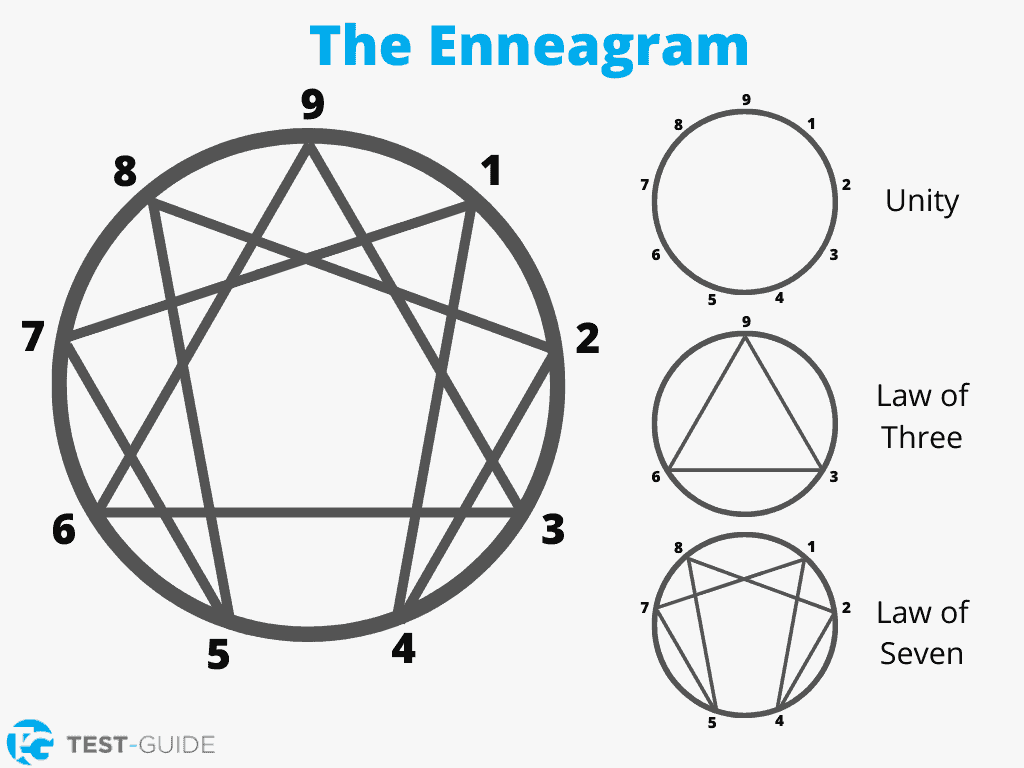Take our Enneagram test below to learn about your personality type.
Our exam is completely free and will give you instant results when you finish. No registration required!
Free Enneagram Test
Answer 36 questions to find out more about your personality type.
What is an Enneagram Test?
An Enneagram personality test is a test used to determine your personality type. It will ask you a series of questions about yourself.
You will be required to answer each question as honestly as possible. There are no right or wrong answers, but the more honest you are when taking the exam, the more accurate your results will be.
At the end of the exam, you will be given one of nine personality types.
Example Question:
Money is important to my happiness
- Disagree
- Slightly Disagree
- Neutral
- Slightly Agree
- Agree
The 9 Enneagram Personality Types
After taking our free Enneagram test, you will be assigned one of nine personality types:
- Type 1: The Reformer, The Perfectionist
- Type 2: The Helper, The Giver
- Type 3: The Performer, The Achiever
- Type 4: The Individualist, The Romantic
- Type 5: The Investigator, The Observer
- Type 6: The Loyalist
- Type 7: The Enthusiast, The Epicurean
- Type 8: The Challenger, The Protector
- Type 9: The Peacemaker, The Mediator
Type 1: The Reformer, The Perfectionist
A type 1 Enneagram personality type is a perfectionist and principled. Their actions are measured and purposeful.
Type 1’s are honest, meticulous, and fair. They manage their lives with the highest of expectations. While ethical, type 1’s can be quite critical, which is misperceived as controlling too often. Type 1 personalities have a strong drive to make improvements on their way to achieving perfection.
Type 1’s are frightened most by appearing wrong or of being imperfect.
Type 2: The Helper, The Giver
A type 2 person is a generous, thoughtful type who tends to be a people pleaser. They can meet the needs of others beyond mere empathy. Type 2’s love to help or cater to others, often forsaking their own needs for those they help. Type 2’s embody the notion of selfless-care.
Type 2’s need to feel needed (and avoid their greatest fear of worthlessness) but become resentful of others when they neglect their own needs.
Type 3: The Performer, The Achiever
A type 3 is an image-conscious person capable of tremendous adaptability and drive. Type 3’s are industrious performers that maintain a calm exterior to get the job done.
They often meet difficult challenges ahead of schedule. The behaviors of a type 3 person speak to their need to avoid being unsuccessful or unambitious.
Type 3’s can be self-absorbed and, at times, inauthentic.
Type 4: The Individualist, The Romantic
A type 4 person is a dramatic expressive type who can become temperamental if left unchecked. Type 4’s are romantic and somewhat idealistic in their artistic and creative expressions.
They love an aesthetically pleasing and balanced lifestyle. Type 4’s strive to appear accomplished to avoid being seen as ordinary.
Type 4’s fear being anything but special and have a deep fear of rejection.
Type 5: The Investigator, The Observer
A type 5 person has a keen sense of perception but can be secretive or even isolate from others due to their need for self-sufficiency.
Critical details are processed quickly by type 5’s, who are quick to offer independent solutions and opinions.
Type 5’s have a fear of being dependent. They desire independence and need private time for introspection, but have a deep fear of rejection.
Type 6: The Loyalist
A type 6 person is a highly responsible individual who looks for security in an unsecure world.
While a type 6 is often playful and a great, dedicated, and loyal friend, they tend to focus on what could go wrong, bringing a negative spin which is often counterproductive.
Type 6’s are suspicious and, at times, anxious. They are afraid of fear itself, authority, and being alone.
Type 7: The Enthusiast, The Epicurean
A type 7 is a versatile person who often prefers spontaneity to rigidity. They love new ideas and are proficient problem solvers and optimistic industry leaders. Type 7’s can be inspiring leaders offering great vision.
Type 7’s have a fear of criticism, feeling trapped and being disappointed. They find it challenging to forgive others.
Type 8: The Challenger, The Protector
A type 8 is a willful person who exudes self-confidence, self-reliance, and self-assurance. They prefer to view themselves as powerful heroes – a champion for underdog causes.
While a type 8 is unafraid of confrontation, they speak the truth despite a directness which often stings.
Type 8’s have a fear of being perceived as vulnerable or weak.
Type 9: The Peacemaker, The Mediator
A type 9 is a kind and friendly person who is accepting, entertaining, and a good listener. They have the skills to process the many sides of one story, which makes a type 9 a skillful mediator or arbitrator.
Type 9’s seek harmony, which can lead to complacency and inaction. They fear abandonment, separation, and loss and consistently strive for peace of mind and stressless-ness in their life.
Enneagram Figure, Triads, and Wings
The word Enneagram is a compounded word from two Greek stem-words meaning ‘nine’ and ‘something is written/drawn.’
From a visual perspective, an Enneagram is a geometric figure with nine sides that represent the human psyche. Each of these sides symbolizes one of the nine potential Enneagram personality types.
The enneagram figure consists of three primary parts:
- A Circle: Symbolizes Unity
- An Inner Triangle: Speaks to the Law of Three
- An Irregular Hexagon: Speaks to the Law of Seven
The lines connecting the points on the enneagram figure reveal the inter-connectedness of certain personality types.
Enneagram Wings
You may hear people refer to “Enneagram wings” when talking about this personality test. The wings are the Enneatypes located on both sides of your personality type.
Example: If you were a type 5 personality, your wings would be 6 and 4.
The wings help show the connection between your predominant personality type and your neighboring personality types.
Enneagram Triads
The 9 personality types can be grouped into 3 “triads.” These triads help give a deeper insight into the different Enneagram types and how they are connected.
- Heart or Feeling Triad: Personality Types 2, 3, and 4.
- Head or Thinking Triad: Personality Types 5, 6, and 7.
- Gut or Instinctive Triad: Personality Types 8, 9, and 1.
Other Personality Tests
If you want to take a different personality exam, try one of our other exams:
Frequently Asked Questions
How long is your Enneagram test?
Our Enneagram test is 36 questions long.
How long does your Enneagram test take?
There is no time limit on our exam. It generally takes 10-15 minutes to complete.
Is your exam free?
Yes, it is 100% free. Our free Enneagram personality test is a great way to find out what your personality type is.
Is there an official Enneagram exam?
There is not an official Enneagram exam. Most exams follow a similar structure, but there is not an official exam or provider.


